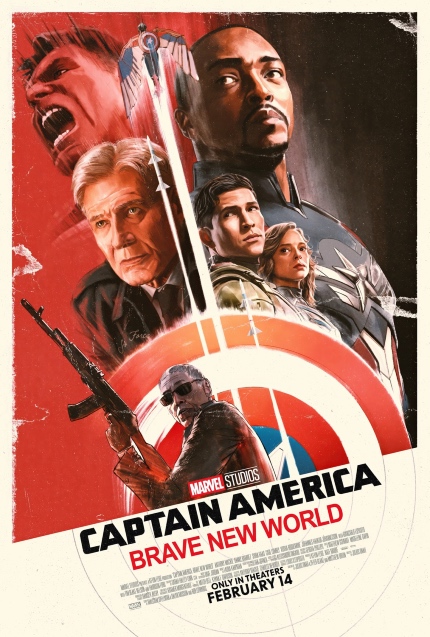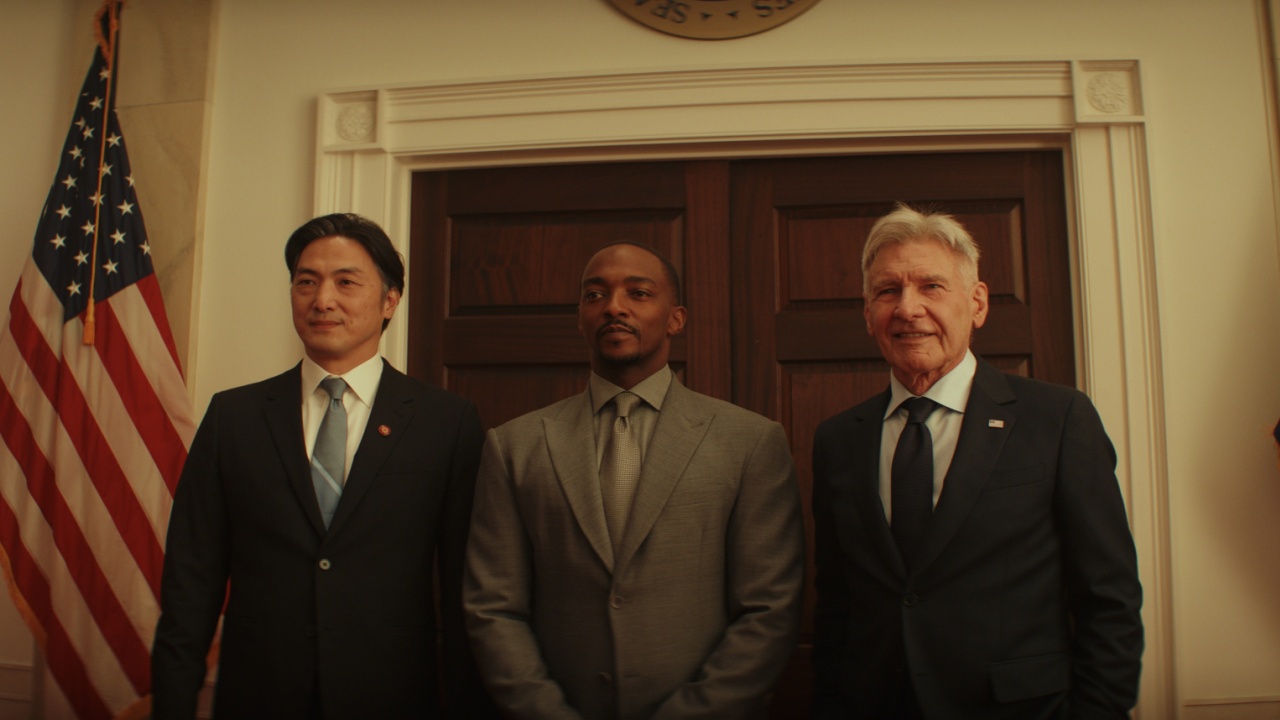CAPTAIN AMERICA: BRAVE NEW WORLD Review: Pacifying Propaganda Engages, Disturbs
Anthony Mackie and Harrison Ford star; Julius Onah directed.

More than a decade after the last Captain America movie (Civil War is an Avengers movie), Marvel returns to its most propagandistic hero with a film that sees Sam Wilson (Anthony Mackie) don the mantle, following in Steve Rogers' (Chris Evans) footsteps.
While they're both heroes who've appeared in their fair share of Marvel Cinematic Universe movies, there are two major differences between the Captains: first, Wilson is Black, and second, he never took the Super-Soldier Serum that made Rogers Captain America in the first place.
It's easy enough to read Rogers's literal superhumanity in comparison with Wilson's humanity as a comment on the advantages granted white people and withheld from Black people. And in a genuine surprise for a movie from a comically cowardly entertainment corporation, Captain America: Brave New World dives headfirst into addressing the relationship of Blackness and the Captain America title.
Early in the film, we meet Isaiah Bradley (Carl Lumbly), a Black man who was one of the first soldiers injected with the Super-Soldier Serum. After his injection, Bradley spent 30 years of his life in prison being experimented on by the US government in a shocking plot-beat for a Marvel movie. It's not the acknowledgment of the US's horrifying history of experimenting on Black people that's most impressive about Brave New World's engagement with Blackness, though; it's that Wilson refuses to turn his back on that history for his own gain.
At the inciting event for the film's throwback political thriller plot, president Thaddeus Ross (Harrison Ford) has Wilson pose with him and other heads of state, using the Black Captain America as a marker of his nation's justness. But when Bradley opens fire on Ross while under mysterious mind control and is promptly arrested and sent to prison, Wilson doesn't brush his friendship with the older Black man away to ensure his continued place as a government-approved American icon. Instead, Wilson places himself firmly in opposition to the President and commits himself to clearing Bradley's name.
The ensuing investigation that reveals a conspiracy with perfectly comic-booky details and the same broad strokes as several other political thrillers moves along well enough. The opening raid on a scheduled meet between smugglers at a Church ends in Wilson and his teammates questioning why smugglers would choose such an inopportune place for an exchange. The multiple villains who slowly reveal one another work well narratively (even if it is easy to see where the buck will stop) and it's always wonderful to see Giancarlo Esposito in bad guy mode. Stiffly composed establishing shots combine with a tense string and snare heavy score to maintain a sense of uncertainty and anticipation.
The requisite action scenes vary greatly in quality but never bring the film's momentum to a standstill. Though the hand-to-hand fights threaten to; they're so slow and simply choreographed that you can almost see Mackie thinking "ok and then I do this." On the other end, a large-scale sequence featuring Mackie's airborne hero engaging in dogfights with fighter jets and racing to stop missiles from striking their aircraft carrier targets is rousing.
The movie is mostly solid, mid-tier Marvel stuff that successfully evokes the political thrillers of the 1990s. Yet it seems Brave New World can't help itself as a piece of propaganda and in its final third injects some disconcerting political messages and tops them with self-congratulation for the corporation behind the film.
An early mention of someone joining the military because of Wilson's success as Captain America almost reads as critical of the power of Captain America as an advertisement for convincing young men to give their lives to their government. As the film goes on though, several moments deftly function as both military advertisement and Disney patting themselves on the back for gifting audiences a Black Captain America. At one point a character tells Wilson that he gives people something to aspire to. Towards the end, the new Falcon (Wilson's former superhero persona) Joaquin Torres (Danny Ramirez) gives the standard "representation matters" speech, about being a military superhero.
Wilson himself gives a speech urging infighting Americans "to see the good in each other." A message that's deeply irresponsible at a time when white supremacism is on the rise and the President is fast-tracking the ideology's tenets into policy (even if the film was completed before his inauguration). There's also the alignment of Wilson and Bradley with an Israeli agent in what, at this particular moment especially, lands as an attempt to communicate "we'll recognize the wrongs the US has perpetrated against Black Americans, but don't stand in solidarity with Palestinians" to Black viewers.
These variously naive, masturbatory, and alarming messages leave at minimum a bad aftertaste and at most a political rage. The earlier thoughtful treatment of Blackness and the solid but not special action thriller elements are worth something, but they don't outweigh the sense that the film is meant to pacify any potentially galvanizing political feeling in American audiences.
The film opens February 14, only in movie theaters, via Marvel and Disney.
Captain America: Brave New World
Director(s)
- Julius Onah
Writer(s)
- Rob Edwards
- Malcolm Spellman
- Dalan Musson
Cast
- Harrison Ford
- Liv Tyler
- Rosa Salazar









